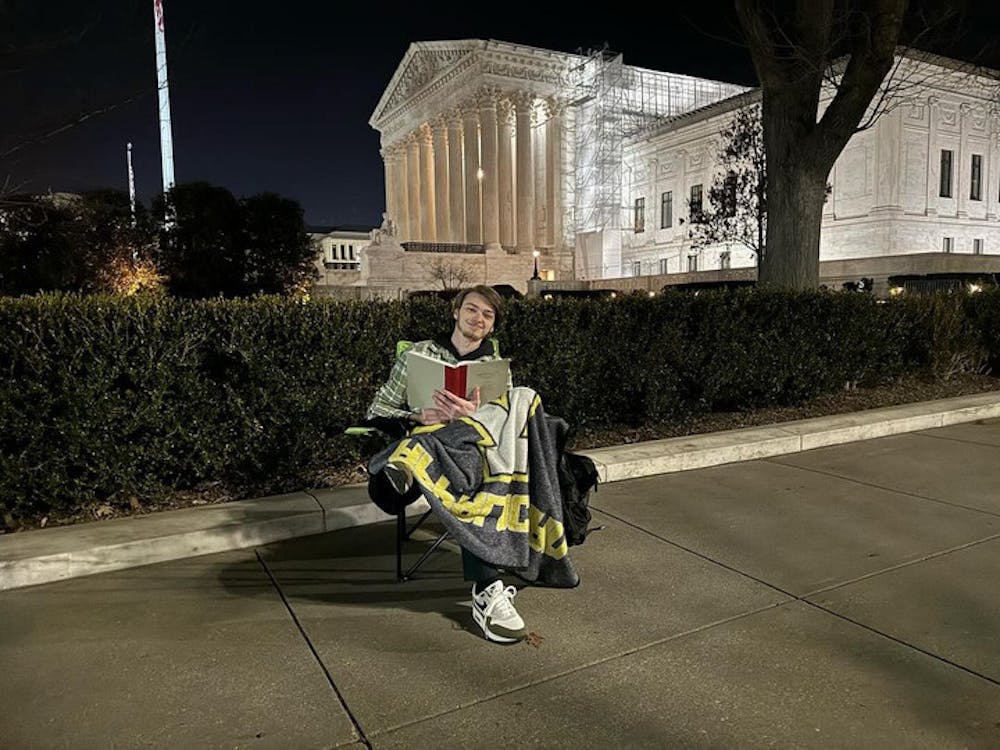Elon Law student Landon Eckard left for D.C. as soon as he got out of class on Tuesday, Feb. 6. After arriving at the Supreme Court building around 7 p.m., Eckard waited in line for a seat in former President Donald Trump’s Supreme Court hearing on Feb. 8 — where The Court deliberated if Trump should be barred from the 2024 presidential ballot.
With a lawn chair and some blankets, Eckard was third in line and waited for two days.
According to Eckard, he attended the hearing because it was a huge moment to learn about the law field, as well as an opportunity to experience a pivotal moment for the nation. He said being in the courtroom was unlike anything he’s experienced as reading the Court’s opinion out of a textbook is much different than physically seeing them speak.
“There's certain things that you just can't discern through the opinions, like the attitude of the Justices or the attitude of the attorneys — or like facial expressions and stuff that the Justices make,” Eckard said. “This case is going to have big importance for the political and legal sphere, so I think that being in there was a big bonus for me to be able to learn outside of the classroom setting.”
Ultimately, Eckard said he really enjoyed the experience and learned a lot about things that he could do to progress through his legal career. According to NPR, The Court still remains skeptical of removing Trump from the ballot.
“A lot of people ask me ‘What's the right way for this court to decide?’ And I don't have an exact answer to that question, but I think in terms of the election, the court’s going to make the best argument that they believe is right for the country,” Eckard said. “That's something that they really talked about in the arguments is the implication that anybody can just accuse anybody of being an insurrectionist, and then under this ruling, they're barred from the ballot.”
As a law student, Eckard said he thought the arguments and questions presented by the Justices were one of the most interesting aspects of the hearing.
“I could just see the people that I’ve read so many opinions about and heard so many times through my phone or my computer,” Eckard said. “And it was great just to be able to see them engage with this case for the first time, so I definitely don't regret it. It was cold — I spent two cold nights out there — but it was well worth it.”
However, he said the most surprising thing about being in the room was getting to see the more human side of each of the Justices.
“Justice Jackson was very direct, and not confrontational in a bad way,” Eckard said. “She made the courtroom laugh a couple times, and so did Chief Justice Roberts. That was a cool moment, where little comments that the Justices make that makes the whole courtroom laugh and that kind of builds like a more humane or humanity side to it. Like it's not just this tense moment 24/7.”
With the U.S. so politically divided, especially as elections approach, Eckard also said it was nice to experience each Justice interact with each other in a professional way.
“It was cool to see how Justice Gorsuch and Sotomayor — two people on different political sides — and in the middle of this big argument, kind of talking to each other and laughing at something,” Eckard said.
Another aspect of the hearing that Eckard found surprising was the nature of the arguments set up by both Trump’s legal team and the Supreme Court. According to Eckard, the majority of the discussion centered around if Trump technically applied to Section 3 of the 14th Amendment — or the Insurrection Clause.
Under this clause, it is stated that no officer of the U.S. can hold office if they have engaged in insurrection. Eckard said he was surprised because instead of deliberating on if Trump deliberately caused the Jan. 6, 2021 insurrection, each side spent the majority of the time deciding whether or not Trump fit into the definition of an Officer of the United States as a former President.
“Chief Justice Roberts had some really good questions about the merits of the case and the impact that it could have for the country in the future,” Eckard said. “They were also trying to look into the future like ‘What implications does this case have on future things that happen?’”
Eckard highly encouraged anyone who had an opportunity to sit in on a Supreme Court hearing to take advantage of it, as well as encouraged everyone to take specific care and concern for the country’s political system.
“Even if you don't agree with what the court says in this opinion, you still have the right to have your voice heard and argue your case,” Eckard said. “There's still other ways you can really assert your rights and ensure your voice is being heard as a citizen of the political system.”


